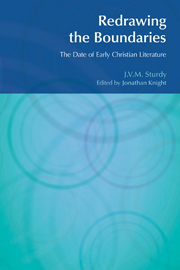Book contents
- Frontmatter
- Contents
- Preface
- Abbreviations
- 1 The Problem Posed
- 2 1 Clement
- 3 The Letters of Ignatius
- 4 Polycarp
- 5 Early Christian Literature: Some Parameters of Date
- 6 The Relationship of the Synoptic Gospels
- 7 Mark
- 8 Luke
- 9 Matthew
- 10 Acts
- 11 The Pauline Corpus: Its Growth and Development
- 12 The Catholic Epistles
- 13 Johannine Literature
- 14 Summary and Conclusions
- Appendix
- Notes
- Bibliography
- Index of Names
- Index of References
Appendix
- Frontmatter
- Contents
- Preface
- Abbreviations
- 1 The Problem Posed
- 2 1 Clement
- 3 The Letters of Ignatius
- 4 Polycarp
- 5 Early Christian Literature: Some Parameters of Date
- 6 The Relationship of the Synoptic Gospels
- 7 Mark
- 8 Luke
- 9 Matthew
- 10 Acts
- 11 The Pauline Corpus: Its Growth and Development
- 12 The Catholic Epistles
- 13 Johannine Literature
- 14 Summary and Conclusions
- Appendix
- Notes
- Bibliography
- Index of Names
- Index of References
Summary
Sturdy's Review of Redating the New Testament
The following text was originally published as J. V. M. Sturdy, “Review of J. A. T. Robinson, Redating the New Testament (London, 1976),” JTS 30 (1979): 255-62.
Dr Robinson's aim is to establish the thesis that every book of the New Testament (with the Didache and 1 Clement for good measure) was composed before 70 CE. He holds that there is little or no solid evidence for the dates at present usually attached to the New Testament books, and that there is one feature of the New Testament, oddly ignored by scholars, which demands an extensive redating: the failure of them to mention the fall of Jerusalem. Individual books are then discussed, and detailed arguments brought forward in support of the central position. A final chapter summarizes the argument, with highly critical remarks on the work of contemporary New Testament scholars.
The book is characteristic of Dr Robinson at his best: lively, ingenious and thought-provoking. But along with this it has serious faults, which must lead to a final definitely adverse judgement. These will be brought out in some fullness, since the subject is an important one.
The centre of gravity of British scholarship shifted sharply in the fifties to a much more general acceptance of non-traditional positions among critical scholars; but there are still a substantial number of British scholars of an older school to whom Robinson's views will not seem all that strange or indeed novel.
- Type
- Chapter
- Information
- Redrawing the BoundariesThe Date of Early Christian Literature, pp. 87 - 94Publisher: Acumen PublishingPrint publication year: 2008

